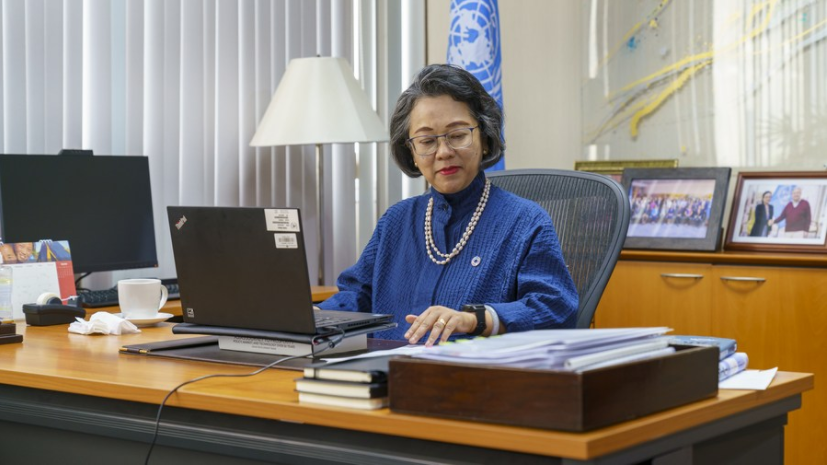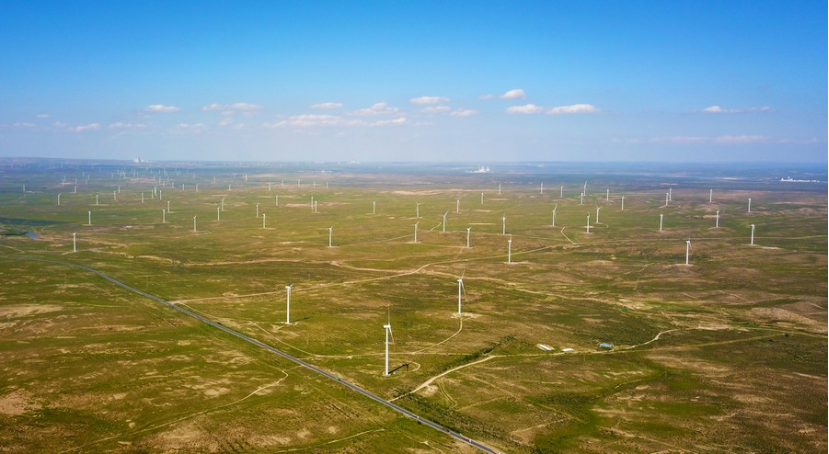
Photo taken on Oct. 12, 2021 shows Executive Secretary of UN Economic and Social Commission for Asia and the Pacific (ESCAP) Armida Alisjahbana gives a virtual interview to Xinhua at her office in Bangkok, Thailand. (Xinhua/ESCAP)
Executive Secretary of UN Economic and Social Commission for Asia and the Pacific (ESCAP) Armida Alisjahbana said that China's role as a permanent member of the UN Security Council is crucial to international cooperation in pursuing the Sustainable Development Goals (SDGs) and fighting climate change.
China has contributed in a significant way to tackling global development challenges such as poverty and climate change, a senior official of the United Nations (UN) said.
Armida Alisjahbana, executive secretary of UN Economic and Social Commission for Asia and the Pacific (ESCAP), said during a virtual interview with Xinhua recently that China has shown its leadership through successful reduction of absolute poverty, commitment to net zero emissions by 2060, and decision to stop funding coal-fired power plants abroad.
TOP: Photo taken on Nov. 25, 2016 shows a view of Tuoping Village in Fugong County, Lisu Autonomous Prefecture of Nujiang, southwest China's Yunnan Province.
BOTTOM: Aerial photo taken on Nov. 3, 2020 shows a view of a relocation site for villagers of Tuoping Village. (Xinhua/Hu Chao)
"We are very much looking forward to a stronger leadership, commitment and contribution of China (towards) all global development challenges," she said.
Speaking ahead of the 50th anniversary of the restoration of the lawful seat of the People's Republic of China in the UN, Alisjahbana highlighted that security and peace are fundamental for global development and that China's role as a permanent member of the UN Security Council is crucial to international cooperation in pursuing the Sustainable Development Goals (SDGs) and fighting climate change.
The Bangkok-based ESCAP, composed of 53 member states and nine associate members, is one of the five regional commissions of the UN, aiming to foster economic connectivity and deal with social development challenges in the Asia-Pacific region.
China has been one of ESCAP'S major partners and member states for decades. "Collaboration in the past few years has been excellent," Alisjahbana said, adding that within the framework of the China-ESCAP Cooperation Program, priority areas like transportation, energy, health and social development have seen closer cooperation between the two parties.

Aerial photo taken on Aug. 24, 2018 shows the Taiyangshan wind power station in the city of Wuzhong, northwest China's Ningxia Hui Autonomous Region. (Xinhua/Guo Xulei)
Poverty reduction is one of the major targets of the SDGs and a key focus area of ESCAP. Alisjahbana said that China's achievement in eliminating extreme poverty is "definitely commendable", not only significantly advancing the progress of achieving the SDGs, but also providing experiences for other countries with similar needs.
She further emphasized the efforts China has made for the carbon-neutral target, which she believes is "a major step here in the right direction in combating climate change."
"We also would like to see more initiatives, and certainly China could play a leading role in scaling up solutions," she said, adding that she believes that regional developing countries are looking forward to collaborating with China to find alternative solutions in new technologies to reduce carbon emissions.

